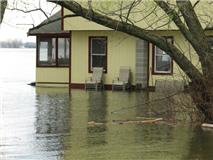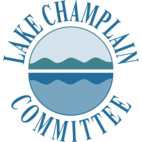IJC Calls for Flood Forecasting

New flood maps will help lakeside owners better know their risks. Photo by Greg Epler Wood.
The International Joint Commission has approved a final report calling for improvements in flood forecasting on Lake Champlain and the Richelieu River. The report was prepared by a Technical Working Group and grew out of the lake and river flooding that occurred in 2011.
The Workgroup was charged by the federal governments of the United States and Canada to address two particular issues:
1. Closing the gaps in the data needed for future real-time flood
forecasting and inundation mapping system, and
2. The creation of static flood inundation maps.
The Workgroup prepared inundation maps for eleven different flood levels ranging from 100 feet to 106 feet above sea level (the 2011 lake level crested at 103.2). A preview of the maps is available on the IJC website. People who own property along the lake can review the maps to determine at what lake level their property would be inundated. The maps do not account for wind and wave action which could increase the affected areas. The Commission has also recommended that a binational coordination body be mandated and funded to consolidate and synthesize flood forecasting work.
This project was part of a 2013 plan of study developed by the International Joint Commission to deal with flooding issues. Implementation of the plan of study has been phased in as funding has become available.
LCC has had a long interest in flood issues on the lake dating back to the IJC involvement in the 1970s that considered regulating lake levels. LCC has advocated that we need to improve flood forecasting, but our responses should be to take steps to move people away from floods rather than intervening to try and keep floods away from people. The flood maps produced by the IJC make clear the risks to all those living along the lake, and what stage of flooding presents the greatest threat to their property. Continuing with developing strong flood forecasting tools would be a welcome next step.
